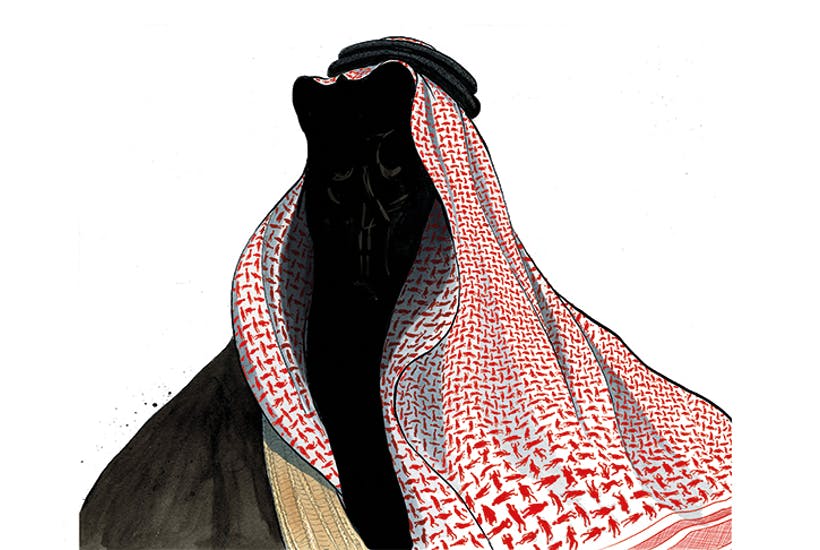My guess is President Trump’s team spent hours, maybe days, fretting over how to word his statement on US-Saudi relations after the grisly murder of Jamal Khashoggi, and then the man himself just did it. A little of the old genius razzle dazzle – the work of a moment. ‘It could very well be that the Crown Prince had knowledge of this tragic event – maybe he did and maybe he didn’t!’
Speaking as someone who’s written more than his fair share of bloodless, madly nuanced corporate statements, Trump’s handiwork – which is that sentence alone (complete with showbiz exclamation mark!) – stands out a mile. It’s so perfect I suspect very soon we will hear it widely parroted, not least by CEOs of international corporations desperate to fill their boots in the all-new, inclusive Saudi Arabia, and perhaps even by the man many believe ordered the killing himself.
‘Look, I will be honest with you,’ Saudi’s sporty young de facto despot Mohammed bin Salman could say. ‘I may have ordered the killing, I may not. I have a lot on. I can’t be expected to remember everything.’ At this stage, it’s probably the only way out of what has become a desperate mess.
No one could argue MBS, as bin Salman is known, is not sufficiently busy to forget the odd extra-judicial killing. For a start, there’s the continuing genocidal bombardment of Yemen, which must be taking up his time. There’s also the possible Manchester United acquisition. And then there’s the wild military flirtation with Russia, 67-year Mutual Defense Assistance treaty with the US notwithstanding. According to a letter seen by Reuters, MBS has demanded his defence ministry explore purchasing weapons from Putin rather than from Trump. Hectic, hectic, hectic.
Now, of course, MBS is busier than ever – trying to stay a step ahead of plans to sideline him. Dozens of princes within the Al Saud family are believed to be keen that someone other than MBS takes the reins when old man King Salman finally hangs up his dishdash. Prince Ahmed bin Abdulaziz, the 76-year-old brother of the king, has recently returned to Saudi from London and is already being touted as a possible alternative. Presumably, this talk will continue unless something unfortunate happens to him – unfortunate, for example, like the fate of Prince Mansour bin Muqrin, a believed opponent of MBS, who in 2017 happened to be in a helicopter that crashed near the Yemen border. The sort of thing that could happen to anyone. Anyway, I digress.
The reason Saudi princes – even those not last year hung upside down in the Riyadh Ritz Carlton on the orders of MBS until they agreed to sign over large chunks of their loot – are getting twitchy about the 33 year-old’s accession to the throne is because, as I’ve written before, as a direct result of the Khashoggi affair much needed foreign investment into Saudi Arabia is now not occurring. Because how could it? All large international businesses in recent years have succumbed to the corporate mania for publishing ‘values’ statements. None of these statements, I believe, makes mention of being OK with torture and genocide.
Take Siemens, for example, who last month delayed a Saudi deal worth $30 billion. At the time, CEO Joe Kaeser published an incredibly wet 1,145-word essay on LinkedIn in which he fretted over both the decision and whether or not he should attend the so-called ‘Davos in the Desert’ Riyadh investment forum – ‘I will not attend,’ he wrote, ‘it’s the cleanest decision but not the most courageous one’ (spoiler alert: according to Kaeser, the most courageous decision would have been to attend the conference and to press ahead with the massive deal).
But the real reason Kaeser did not attend, of course, is because Siemens has in black and white articulated its commitment to its core value of ‘being responsible’ thus: ‘Responsible means that we are committed to ethical and responsible actions.’ Very hard to square that statement with doing business with the Saudi’s post-Khashoggi.
But it’s not just Siemens. Numerous other international business leaders were also conspicuous by their absence at the Riyadh forum, including the heads of BlackRock (‘we pride ourselves on our reputation for conducting business activities in the highest ethical and professional manner’), HSBC CEO, John Flint (‘standing firm for what is right’) and JPMorgan (‘maintaining the very highest standards of integrity’). Usually, this platitudinous drivel serves precisely no purpose, but suddenly now it’s proving horribly effective in preventing corporations getting into Saudi. Which is why the Trump line – filled as it is to the brim with wriggle room – is so brilliant. ‘There are more things in heaven and Earth, Horatio, than are dreamt of in your philosophy,’ Shakespeare had Hamlet say when he wanted to make his audience consider the complexity of the human experience. ‘Maybe he did and maybe he didn’t!’; for my money works just as well.
Soon there will be a trial – the Saudi public prosecutor apparently seeks the death penalty for five men accused of carrying out Khashoggi’s murder. One suspects, given the trial is to be held in the kingdom and the nation’s viability as an investment destination is at stake, the prosecutor might just be successful. Will that be enough to enable foreign investors to come piling on in? After Trump’s statement, and his decision to safeguard US-Saudi ties, the likelihood is it will. But will it be enough to stop the world asking who ordered the hit? That’s a rather harder one to answer.






Comments